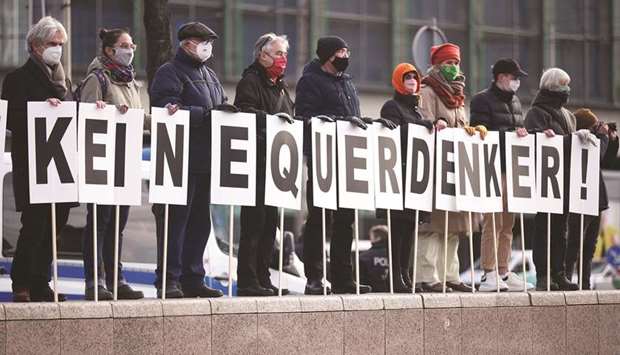Italy, one of the countries hit worst by the coronavirus pandemic, plans to launch a massive vaccination campaign in January, Health Minister Roberto Speranza said yesterday.
The coronavirus causes the Covid-19 respiratory disease.
The vaccine drive “will get underway towards the end of January when we hope to have the first doses”, Speranza told a meeting of pharmacists.
“This campaign will be without precedent ... it will require an extraordinary mobilisation” of resources, he said.
Italy, like its European peers struggling to cope with a devastating second wave of the pandemic, has recorded some 1.3mn cases and a death toll of nearly 50,000 since the coronavirus took hold early this year.
There has been a global effort to find treatments and vaccines and earlier this month US pharma giant Pfizer and its German partner BioNTech reported a breakthrough with a jab shown to be more than 90% effective.
The company this week applied for emergency use authorisation in the US and several other firms look set to follow in due course, with the first vaccines to be rolled out possibly before the end of this year.
“Vaccines represent a huge advance in the history of humanity,” said Speranza, defending their use in a country which has seen some notable opposition to their introduction.
“Today we are talking about the concrete possibility that ... in a short time we will dispose of this tool and that gives a measure of the capacity of human beings to react in the face of such a large challenge,” he added.
Even as the virus continues to devastate the world economy and put health systems under intense pressure, strong anti-vaccination sentiment persists in many countries, despite efforts by the authorities to reassure people over their safety and effectiveness.
On Friday, the experts group set up to advise the Italian government said that both national and international oversight of vaccine development “gives us guarantees” on their safety.
However, an Ipsos opinion poll for the La7 television chain showed earlier this week that 16% of Italians would refuse a vaccine available next year, and 42% would wait to see if it was effective.
Only one-third said they would definitely get the vaccine as soon as it was available.
Germany has meanwhile identified six sites in the capital Berlin to be used as centres to administer the new coronavirus vaccination, an official at the civil protection agency said yesterday, calling for volunteers to carry out the work.
The sites, which include Berlin’s trade fair as well Tempelhof and Tegel airports, will be set up by mid-December, said Albrecht Broemme, project manager for vaccination centres at the Federal Agency for Technical Relief (THW).
“We’ll have centres that are easily reachable by public transport,” he said, adding that volunteers would be needed to get the work done.
He added that although some volunteers would require a medical background, “...we don’t need chief physicians and such highly-qualified people”.
Germany is scouting trade fair halls and airport terminals to use as potential mass vaccination centres, as it draws up plans to inoculate the nation as soon as the first coronavirus shot gains European approval.
Under the national vaccine strategy, approved by its cabinet in October, Germany has asked the states to identify central vaccination centres which will be supplemented by mobile teams who go into care homes.
Shopping centres will reopen in Poland in a week’s time, Prime Minister Mateusz Morawiecki said yesterday, in a boost to retailers in the run-up to Christmas, but he added that the government was working on rules to limit travel.
The government closed entertainment venues and some shops from November 7 after a surge in Covid-19 cases, but infections have levelled off since then, allowing some loosening of restrictions.
“There is one condition ... the discipline of every shop, mall, furniture store. If not, these stores will be closed,” Morawiecki told a news conference. “These decisions can save hundreds of thousands of jobs, which is why we are taking them.”
However, Morawiecki urged Poles to spend Christmas only with the closest relatives in their households and not to travel, saying the government was working on restrictions to limit movement.
“Reducing contacts is fundamental for the further development of the pandemic. We are working on legal options to limit movement,” he said.
He said schools would remain closed until Christmas.
Russia’s President Vladimir Putin told G20 leaders yesterday that Russia is ready to provide its Sputnik V coronavirus vaccine to other countries that need it.
Russia is also preparing its second and third vaccine, Putin said, adding that creation of vaccine portfolio was “our common goal”.
More than 57.7mn people have been reported to be infected by the novel coronavirus globally, and 1,375,170 have died, according to a Reuters tally.
Infections have been reported in more than 210 countries and territories since the first cases were identified in China in December 2019.

People hold letter signs forming ‘no mavericks!’ as they protest yesterday against a demonstration held by coronavirus sceptics in Leipzig, Germany.
